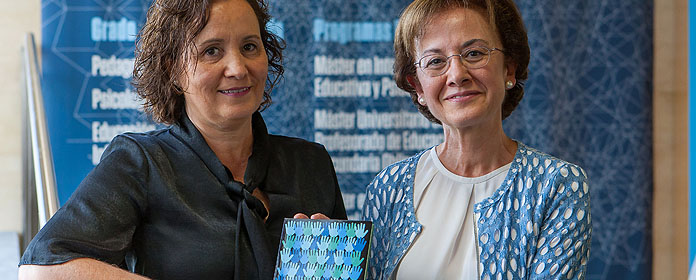'Making the University in the social space'.
New book by Concepción Naval and Elena Arbués on Service Learning

The Dean of the School of Education and PsychologyConcepción Naval and the professor and director of the Master's Degree of faculty, Elena ArbuésElena Arbués are the editors of the new book "Making the University in the social space"in which researchers and professors from other academic institutions participate.
What is the goal of the book and what can the reader find in it?
CN: In this publication we show some research and experiences of various experts, architects in the implementation of this methodologyfaculty, student body, community partners and other beneficiaries). We are aware that the main contribution of the university to society and Economics will continue to be the training of highly qualified, critically aware and socially responsible graduates.
What is Service Learning?
EA: Service Learning is based on the following elements: service to the community and transmission of knowledge, skills and attitudes to students. Undoubtedly, these are well-known elements, but when combined they give as result a greater educational effectiveness. Let us not forget that cooperation, reflection and civic responsibility are key concepts in service-learning.
What steps should a teacher who has not yet applied the service-learning methodology take? And those who already know it, how can they improve in this area?
EA: In order to implement a project it is necessary to start by: Establishing the partnership between institutions, designing an action plan, with learning and service objectives, and the concretion of actions that allow students to open up to real needs of the community and analyze that reality. Then the implementation of this plan will be implemented with the real involvement of young people and finally, the assessment, in order to improve the results and the program, positively reinforcing the student body.
What conclusions does the book reach?
CN: The main underlying idea is that citizens have the responsibility to contribute to the common good and to the development of society and that, therefore, Education is necessarily linked to social responsibility. In this sense, the pedagogical, social and ethical foundations that characterize service-learning make it a suitable means for students to become involved in activities that encourage them to increase their social sensitivity. That is, to become more involved and committed to the community and the exercise of the ethical responsibility that they will have to exercise in their future profession.
What (approximate) percentage of faculty has started to apply this methodology? What is the trend?
CN: In our university more and more professors are implementing it. Initially 45 professors requested it. We cannot give an exact figure, but the seal is already visible in those subjects that use this methodology.
"Doing the University in the social space". In what areas does the University develop its social work?
CN: From the group of research Education , Citizenship and Character (GIECC) we are working -in an effort of partnership with national and international universities-, for promote the introduction of programs that optimize academic performance and improve the social attitudes and civic skills of university students, aspects core topic for their employment rate. Among them is service-learning.
At the University of Navarra we have the support and encouragement of the academic authorities, as well as three important resources that facilitate the implementation of service-learning projects: The Careers Office, for the establishment of partnership agreements with community partners; the Quality and Innovation Service, for the design and implementation of training programs. And, Tantaka, a solidarity time bank, which seeks to make time from members of the university community available to social organizations.
Where do you want to go and how do you want to get there?
CN: In the project from the results of which this book is based, we have worked to disseminate this methodology in our university community, providing information -to professors, staff administration and services, and students- about the research, Philosophy that sustains it and the detection of practices that potentially generate service-learning projects.
It has been a great satisfaction to find good practices in all the Schools and Colleges of the University, without exception, and above all faculty with enthusiasm to learn and participate in this active and experiential methodology for the benefit of student body learning student body
How does service-learning develop the professional competencies of student body demanded by the labor market? What specific competencies does student develop?
EA: There is an abundance of programs of study that point out the benefits of applying this methodology in students and in the communities where it is implemented. Evidence from some of these programs of study, showed significant gains in five areas: attitudes towards oneself, attitudes towards school and learning, civic engagement, social attitudes and skills, and academic performance. They also highlight the importance of linking service-learning programs, to ensure their benefit, to the curriculum, giving voice, community involvement and reflection.
It is also worth paying attention to the ethical challenges encountered in applying this methodology. The book points out how service-learning fosters the imaginative and creative exploration of individuals, opens the horizons of teachers and students, by allowing contact between different groups of people, which otherwise would not be possible. We also underline in this ethical perspective how service-learning offers opportunities to learn about and recognize diverse social problems and real needs of others, encouraging social commitment.
What benefits do institutions (companies, social entities) derive from service-learning?
EA: The participation and involvement of the partnership is decisive for the implementation of the experience and its impact on society. Undoubtedly, the implementation of service-learning activities on internship has the potential to contribute to the connection between university and society.
We hope to continue to make progress in achieving support that will make it possible to find organizations and entities willing to participate in this task educational that adds value to the preparation of students and consolidates a desire for joint social action.




